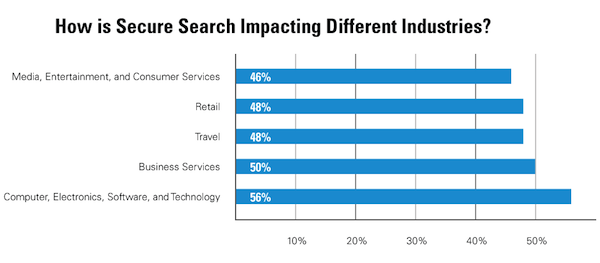BrightEdge recently released findings that confirmed what many marketers are dealing with today: Google’s “(not provided)” designation in Google Analytics is up. Way up. But it’s not the same for all industries. Some experience this nuisance more than others, with the tech industry in first position, according to the study.

What this means is that if you’re in the tech industry, you’re more likely to experience the lack of data on keywords driving traffic to your site. From BrightEdge’s report:
Looking at the latest quarter of BrightEdge data on over 8,400 brands, 56 percent of traffic to computer, electronics, software and technology sites are coming from Google secure search. These categories represent the highest reach for secure searches.
BrightEdge said that it could be related to fact that brands in this industry are marketing to a savvier crowd:
Visitors to these sites may be more savvy with technology and have opted in to secure searches in their browser’s settings, even if secure searches are not the default setting for their browser.
Regardless of the industry, BrightEdge said secure searches are already half of site traffic as of August 2013, and “we anticipate that in the coming year it will be the majority.”
The Rise of “(Not Provided)”
Unfortunately for site owners and marketers, the “(not provided)” data has only grown since Google released encrypted search in beta back in May 2010 and launched itacross all searches for signed-in users in 2011.
After that, many site owners began seeing “(not provided)” in Google Analytics in place of information on individual queries driving traffic to their site. For those who are signed into Google, this initiative was meant to protect users’ privacy when they search online.
Search Engine Watch is certainly experiencing the wrath of “(not provided)” as well. From June to December of 2012, “(not provided)” accounted for 47.1 percent of all organic visits, and from January to June of this year, that number ballooned to 60.2 percent
How to Tackle ‘(Not Provided)’ Data
So what’s a marketer to do? There are a couple things. The first is to explore Google Webmaster Tools to find those “(not provided)” keywords. This post by Ben Goodsell dives into how to recover “(not provided)” keyword data in GWT.
The second thing you can do is something BrightEdge is suggesting: Expand your measurement mindset.
“Marketers need to adjust their long-term strategy as they rely on keyword data less and less. That’s why we are recommending a new paradigm,” said Brad Mattick, vice president of marketing and product at BrightEdge. “Marketers should focus their attention on measuring the business impact of individual pages – how the content on each page is driving traffic, conversions and revenue. We believe that this aligns how most marketers think about their campaigns: content first.”
Mattick said it’s now important to use different sets of data to measure success both at scale and at the detail level.
“Our view is that the best data set to use is what brands actually produce- content, and web pages as the principal type of content. If we take a content-centric view of search, it’s clear that we need to track revenue and visits for all content at scale, but also for individual pages.
“It’s also useful to track leading indicators of future visits and conversions such as social signals like +1s and Likes. In fact, these social signals have always been page-centric, and social SEO is easier to understand at the page level as well.”
